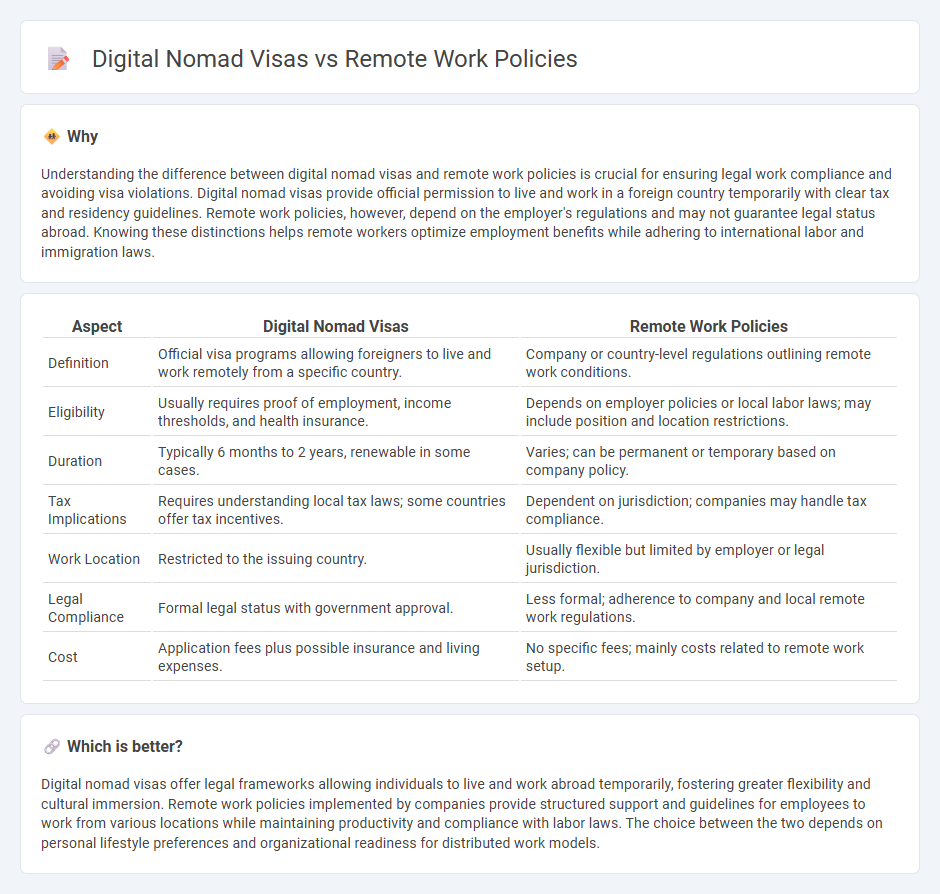
Digital nomad visas offer a legal framework for professionals to live and work abroad temporarily, providing extended stays beyond traditional tourist limits. Remote work policies, typically established by employers, define how employees can perform their duties outside the conventional office setting, focusing on flexibility and productivity. Explore the distinctions and benefits of each to determine the best approach to your global work lifestyle.
Why it is important
Understanding the difference between digital nomad visas and remote work policies is crucial for ensuring legal work compliance and avoiding visa violations. Digital nomad visas provide official permission to live and work in a foreign country temporarily with clear tax and residency guidelines. Remote work policies, however, depend on the employer's regulations and may not guarantee legal status abroad. Knowing these distinctions helps remote workers optimize employment benefits while adhering to international labor and immigration laws.
Comparison Table
| Aspect | Digital Nomad Visas | Remote Work Policies |
|---|---|---|
| Definition | Official visa programs allowing foreigners to live and work remotely from a specific country. | Company or country-level regulations outlining remote work conditions. |
| Eligibility | Usually requires proof of employment, income thresholds, and health insurance. | Depends on employer policies or local labor laws; may include position and location restrictions. |
| Duration | Typically 6 months to 2 years, renewable in some cases. | Varies; can be permanent or temporary based on company policy. |
| Tax Implications | Requires understanding local tax laws; some countries offer tax incentives. | Dependent on jurisdiction; companies may handle tax compliance. |
| Work Location | Restricted to the issuing country. | Usually flexible but limited by employer or legal jurisdiction. |
| Legal Compliance | Formal legal status with government approval. | Less formal; adherence to company and local remote work regulations. |
| Cost | Application fees plus possible insurance and living expenses. | No specific fees; mainly costs related to remote work setup. |
Which is better?
Digital nomad visas offer legal frameworks allowing individuals to live and work abroad temporarily, fostering greater flexibility and cultural immersion. Remote work policies implemented by companies provide structured support and guidelines for employees to work from various locations while maintaining productivity and compliance with labor laws. The choice between the two depends on personal lifestyle preferences and organizational readiness for distributed work models.
Connection
Digital nomad visas and remote work policies are fundamentally linked as both facilitate location-independent employment opportunities, attracting a global workforce. These visas provide legal frameworks allowing remote workers to reside and work in foreign countries, while remote work policies establish organizational guidelines to support flexible, location-agnostic job arrangements. Together, they enable seamless integration of digital nomads into local economies, fostering employment growth and cross-border talent mobility.
Key Terms
Telecommuting
Telecommuting is primarily governed by remote work policies that allow employees to work from home or any location within their country, ensuring compliance with local labor laws and tax regulations. Digital nomad visas, in contrast, provide legal authorization for foreign nationals to live and work remotely in a different country, often with benefits like extended stay durations and simplified visa requirements. Explore how remote work policies and digital nomad visas intersect to support the evolving landscape of telecommuting and global workforce mobility.
Location Independence
Remote work policies enable employees to perform their duties from various locations within their home country or approved areas, emphasizing flexibility without geographical constraints. Digital nomad visas grant legal permission for foreigners to reside and work in a specific country for an extended period, promoting true location independence across international borders. Explore how these frameworks compare and which option suits your lifestyle for ultimate freedom.
Immigration Compliance
Remote work policies primarily govern employee work locations within company frameworks, emphasizing internal compliance and data security, whereas digital nomad visas provide legal authorization for foreigners to reside and work temporarily in a host country under immigration laws. Ensuring immigration compliance with digital nomad visas involves verifying visa eligibility, duration, and tax obligations to avoid legal penalties or deportation risks. Explore comprehensive guides on aligning remote work strategies with immigration regulations for seamless global workforce management.
Source and External Links
Creating a Successful Remote Work Policy | NordLayer Blog - This source outlines key components of remote work policies, including approval processes, employee eligibility, work timing, and guidelines to ensure clear communication and expectations between employees and supervisors.
Your Remote Work Policy Needs to Cover These 6 Things - Plane - This article advises that remote work policies should clearly define scope, eligibility, frequency, permanence, request procedures, and adherence to other company policies for remote workers.
How to Create a Remote Work Policy (With Template) - Indeed - Provides distinctions between fully remote, hybrid, and flexible work policies, suggests periodic evaluations for effectiveness, and highlights the use of remote work surveys to refine policy and support employees.
 dowidth.com
dowidth.com